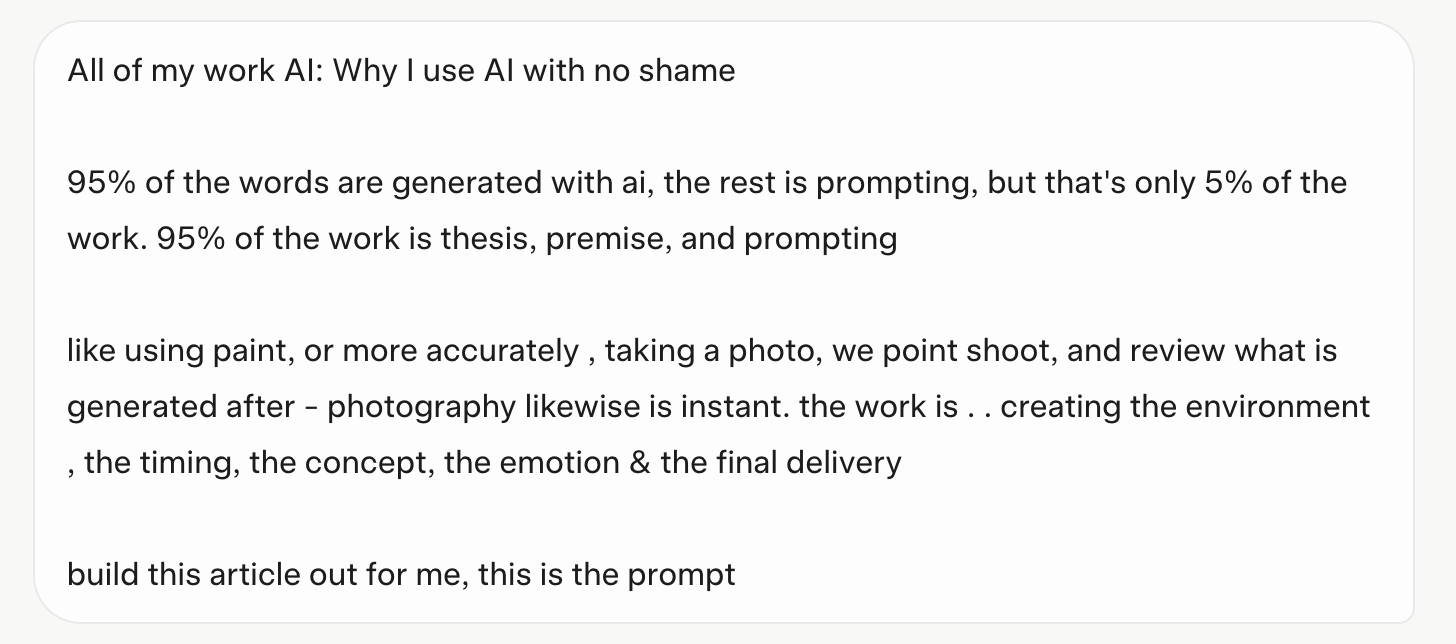I use AI for nearly all my writing. About 95% of the words come from AI, the other 5% are my prompts. That 5% might seem small, but it's just the start. The real work is in the thesis, the research, and crafting those prompts.
If you think I'm just letting AI do everything, you're wrong. This isn't about being lazy. It's about working smarter. The value isn't in typing every word by hand. It's in the ideas and direction. This is the future of creating content.
The Myth of "Original" Creation
People think "real" writing means typing every word by hand. That's wrong. Creators have always used tools. Typewriters, spell-check, now AI. The important part isn't typing. It's the thinking behind it.
My process starts with the thesis. I spend hours researching the topic, figuring out what I want to say, and who I'm saying it to. I build the foundation first. Only then do I write prompts for AI that tell it exactly what to do.
For example, writing about climate change: my prompt would be specific about the argument, what data to include, and how to structure it. The AI follows my direction. I'm not typing the words. I'm directing the work.
Why AI? Efficiency Without Compromise
Some people worry AI makes things less authentic or like cheating. I understand the reaction. But AI doesn't create from nothing. It uses existing knowledge and follows my direction. Since I'm giving the instructions, the result is still mine.
The benefits are practical:
- Speed: What took a full day now takes an hour. This gives more time for thinking and editing.
- Overcoming Blocks: AI helps when I'm stuck. It gives me a starting point to work from.
- Better Quality: AI handles grammar and flow well. I still review and edit everything.
- Accessibility: Not everyone has perfect writing skills. AI helps more people share their ideas.
I always mention when AI is used (like here). The ideas are mine, even if AI helps with the words. Plagiarism tools confirm this.
This is just the start. I've made music with AI. I'll make movies with AI. I'll build houses with AI. In the future, I won't trust doctors without AI or precision robots. The possibilities are huge when you see AI as a tool for human work.
The Real Work: 95% Thinking, 5% Typing
The 95/5 split is misleading. The 5% of prompting is just the surface. The real 95% is the thinking work:
- Thesis: Figuring out what I want to say and why it matters.
- Research: Gathering facts, reading sources, building the argument.
- Prompts: Writing clear instructions so AI understands what I want.
AI isn't replacing me. It's helping me work better. Human-AI teams do better than either alone.
No Shame, Just Progress
Why no shame? Because there's nothing wrong here. AI is ethical when used transparently. News organizations, marketers, and schools already use it. If they aren't ashamed, neither am I.
There are challenges. Some jobs change, but new ones appear. AI can be biased, so I check facts carefully. I also write some things without AI to keep my skills sharp.
AI will make creation more accessible. Students in poor areas could write better essays. Entrepreneurs could create business plans faster. The focus moves from typing to thinking.
The Future is Human-AI
Yes, 95% of these words came from AI based on my prompts. But the idea that AI helps without shame is mine. The belief that thinking matters more than typing is mine. If you're a creator afraid of AI, try it. Write good prompts and see your ideas improve.
In the end, it's not about who types the words. It's about who has the vision. That will always be human.

